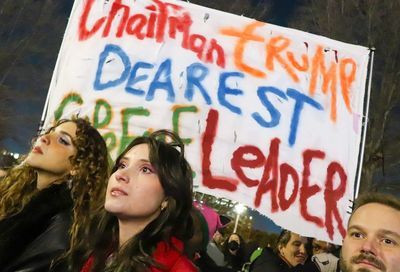Noting that one in 10 Americans are without work and that millions will lose their health insurance this year, President Barack Obama gave his first State of the Union address on Wednesday night. It wasn’t, however, until the closing minutes of the speech that the man who said that he would be a ”fierce advocate” for LGBT equality mentioned any legislative issue specific to that equality.
In his third address to a joint session of Congress, Obama focused, for the first two-thirds of the speech, on the nation’s economic and employment problems. The latter portion of the speech was primarily dedicated to foreign affairs issues.
Early in his speech, though, the President referenced a letter he had received from a woman who very well might have been the voice of the LGBT community, as she wrote, ”We are strained, but hopeful.”
The hope of LGBT Americans for promise of specific action, to the extent it came in Obama’s address to the nation, appeared — in the prepared remarks — in a single sentence addressing the future of Don’t Ask, Don’t Tell. Obama said: ”This year, I will work with Congress and our military to finally repeal the law that denies gay Americans the right to serve the country they love because of who they are.” During the extended applause that followed the line, however, he added a brief aside not appearing in the text: “It’s the right thing to do.”
Before getting there, the President invoked ”our incredible diversity” and ”the promise enshrined in our Constitution: the notion that we are all created equal.” He noted the expanded work of the Department of Justice’s Civil Rights Division, saying it ”is once again prosecuting civil rights violations and employment discrimination.” Raising the one legislative victory secured for LGBT equality in his first year in office, Obama said, ”We finally strengthened our laws to protect against crimes driven by hate.”
Despite the focus on jobs and the economy, there was no mention of the Employment Non-Discrimination Act – a bill that would prohibit employment discrimination on the basis of sexual orientation or gender identity – in the address.
The response from people from across the LGBT community was, as with the view of that letter-writer to Obama, ”strained, but hopeful.”
Rea Carey, executive director of the National Gay and Lesbian Task Force, said, ”While we know the State of the Union speech aims to present broad visions, the next time President Obama speaks to or about our community, he must provide a concrete blueprint for his leadership and action moving forward . . . . The time for broad statements is over. The time to get down to business is overdue. We wish we had heard him speak of concrete steps tonight.”
Richard Socarides, who raised the issue of the repeal of Don’t Ask, Don’t Tell in a strongly worded op-ed in The Wall Street Journal on Monday, said of tonight’s speech, ”It’s great that the president is willing to renew his commitment to end the ban. But at this point, we need action and a timetable. Tonight we got neither.”
Pointing to action urged by The Palm Center, which has studied the negative impact of the military policy, and others, Socarides continued, ”At this point, we need the Secretary of Defense to immediately change the regulations and end the witch hunts and expulsions for no valid reason.”
The response from the Human Rights Campaign’s Joe Solmonese was more measured. ”The Commander in Chief sent a clear message tonight that in a time of war, what matters is that our men and women get the job done – not whether they’re gay or straight,” he said. ”Our country simply cannot afford this discriminatory law that hurts military readiness by denying patriotic men and women the opportunity to serve.”
One prominent supporter of Obama was optimistic. Stampp Corbin, who served as the National LGBT Obama Leadership Council during the presidential campaign and is a San Diego City Commissioner, said, ”The president, once again, reaffirmed his commitment to repealing Don’t Ask, Don’t Tell. This evening, he added a timeline.” He noted, ”By December 31, 2010, lesbian and gay Americans will be able to serve openly and honestly.”
Of the significant national issues addressed in the speech, Evan Wolfson, the executive director of Freedom to Marry, said, ”Millions of gay and lesbian Americans share these same concerns and struggles, but also bear the extra burden of exclusion from marriage and the denial of legal protection in the workplace and at home.”
Wolfson called on Obama to ”keep his promises” and work with Congress to ensure the passage of the Respect for Marriage Act, which would repeal the Defense of Marriage Act and ensure that same-sex couples legally married in one state would continue to have their marriage recognized by the federal government even if they moved to a state that failed to recognize their marriage.
U.S. Sen. John McCain (R-Ariz.), who lost the 2008 presidential election, said in a statement that repealing the Don’t Ask, Don’t Tell policy would be “a mistake.”
“This successful policy has been in effect for over fifteen years, and it is well understood and predominantly supported by our military at all levels,” he said. “At a time when our Armed Forces are fighting and sacrificing on the battlefield, now is not the time to abandon the policy.”
There was no mention of the called-for repeal in the Republican response, given by Virginia Gov. Bob McDonnell. There was no mention of LGBT issues at all, and only a vague reference to inequality in any form. McDonnell said, in closing, “Where opportunity is unequal, we must make it open to everyone.”





















